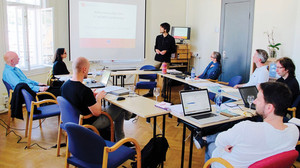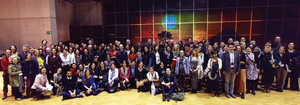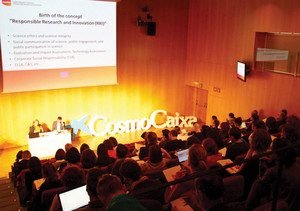
HEIRRI project
HEIRRI members meet at Norway’s University of Bergen in June 2016HEIRRI projectResearchers at universities in Spain, Denmark, Norway, Austria, Croatia, and Belgium joined forces behind the Higher Education Institutions and Responsible Research and Innovation (HEIRRI) project for integrating so-called Responsible Research and Innovation (RRI) into university education and scientific training. The objective—sought in the field and through classroom instruction—is for future scientists and engineers to become more mindful of end users, both in the way their work is applied and in terms its social implications. The project is based on six RRI principles: public engagement, ethics, governance (production methods, interpretation, use and communication of scientific work), science education, gender equality and open access to the results of science research.
Unfamiliarity with these principles, unwillingness on the part of researchers to engage in dialogue, and institutional resistance are the main obstacles to implementing RRI, according to Gema Revuelta, HEIRRI coordinator and director of Spain’s Science, Communication and Society Studies Center at the University of Pompeu Fabra (SCS-UPF). “HEIRRI wants to initiate a systemic change to effectively integrate RRI into the academic curriculum,” she told Pesquisa FAPESP. “RRI brings social and economic benefits and can increase the efficiency of investments in research and innovation, besides providing for society’s needs with transparency, social inclusion, citizen participation, sustainability, and gender equality.”
Founded in 2015 through a €1.5 million (approximately R$5 million) grant from the European Union Horizon 2020 program (planned for three years’ duration), HEIRRI released a September report covering 23 European experiences in this area. Five projects are receiving EU funding and encouraging students, researchers and professors to communicate their findings by adopting open access, and engage with schools, museums and science centers. One of the projects now underway promotes a critical and responsible outlook towards science among European primary and secondary school teachers and students while encouraging them to share materials and experiences. The Training in Public Engagement program at the University College London stimulates communication between academic experts and other groups. Through its Bright Club comedy night, for example, eight to 10 scientists become stand-up comedians as they explain their work on behalf of the general public, while engaging in an evening frolic in which all must partake. The next event, which will be open to the public, will take place in March at the UCL Bloomsbury Studio auditorium.

HEIRRI project
The first HEIRRI conference convened 150 participants from 20 countries at the Barcelona Museum of Science in March 2016HEIRRI projectBesides the European experiences, the HEIRRI project encompasses the following programs: a University of Western Australia program that encourages engineering students and researchers to share professional knowledge and experiences with technical schools and other nearby community organizations; a graduate-level course at the universities of Osaka and Kyoto, in Japan, that examines the ethical, legal and social aspects of science, and a summer course at the University of California at Berkeley that brings together students from engineering, philosophy and the social sciences who, among other activities, write a series of articles about social responsibility and scientific research.
The HEIRRI teams have published RRI proposals at international conferences such as those held in South Africa and Thailand in 2016 and in meetings throughout Europe. In addition, they intend to produce educational materials for undergraduate, graduate, distance or intensive courses regarding the potential for interaction between scientists and other social groups. “With the materials in hand, we will launch a pilot program at 10 institutions of higher learning in Europe and two outside our continent,” said Núria Saladié Elías, SCS-UPF project director and researcher. “The results will help improve the programs and materials, which will later be available through open access to anyone who is interested.”
At the first HEIRRI conference of 150 researchers from 20 countries at the Barcelona Museum of Science, John Goddard, emeritus professor of regional studies from the University of Newcastle, remarked that RRI’s activities may be quite timely. “In Europe, public financing for higher education is being challenged and universities need to demonstrate their value to society, on both the local and national level. Politicians are asking, ‘We have a university in our community, but what is it doing for us?’” Goddard told the conference, adding that “universities are rethinking their responsibilities and expanding their course offerings and services in a way that directly benefits the public.” In this sense, Goddard promotes the concept of the university functioning as an anchor institution capable of serving other institutions in its community. “Universities should be cities unto themselves and not merely institutions situated in cities,” he explains.
 HEIRRI projectBrazil is not unaware of these matters that are being debated in the EU, but “the concept of responsible innovation here is different from the European one,” says Marko Monteiro, anthropologist and professor of political science and technology at the University of Campinas (Unicamp). Monteiro, who coordinates the Brazilian team working on another project in this area with EU funding, explains that in Brazil “we imagine responsibility in science and innovation from an antiquated point of view, one that sees ethics, for example, as nothing more than restricting plagiarism, when it can be much more than this.” Monteiro adds that “Brazilian science is still seen by many as something separate from society, while in Europe there is a much broader and institutionalized debate about how to integrate science and society and how to strengthen the social and economic impact of scientific work.”
HEIRRI projectBrazil is not unaware of these matters that are being debated in the EU, but “the concept of responsible innovation here is different from the European one,” says Marko Monteiro, anthropologist and professor of political science and technology at the University of Campinas (Unicamp). Monteiro, who coordinates the Brazilian team working on another project in this area with EU funding, explains that in Brazil “we imagine responsibility in science and innovation from an antiquated point of view, one that sees ethics, for example, as nothing more than restricting plagiarism, when it can be much more than this.” Monteiro adds that “Brazilian science is still seen by many as something separate from society, while in Europe there is a much broader and institutionalized debate about how to integrate science and society and how to strengthen the social and economic impact of scientific work.”
At Unicamp on February 16, 2017, Monteiro will coordinate an effort by representatives from research institutions in a number of Brazilian states to demonstrate measures—instituted or in the planning stage—to expand the concept of responsibility in the sciences.
Republish